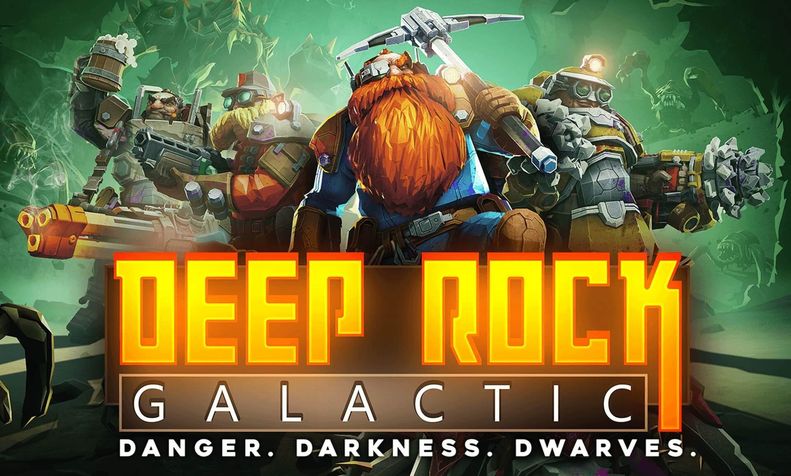Deep Rock Galactic
There was a response to one of my Reddit posts recently, where I waxed philosophical about games, and received the response that not every game is for everyone. It’s something I try to keep in mind throughout this series, especially when I run into something that I objectively understand is good, but which I, for whatever reason, cannot seem to find a place within. It seems especially relevant here.
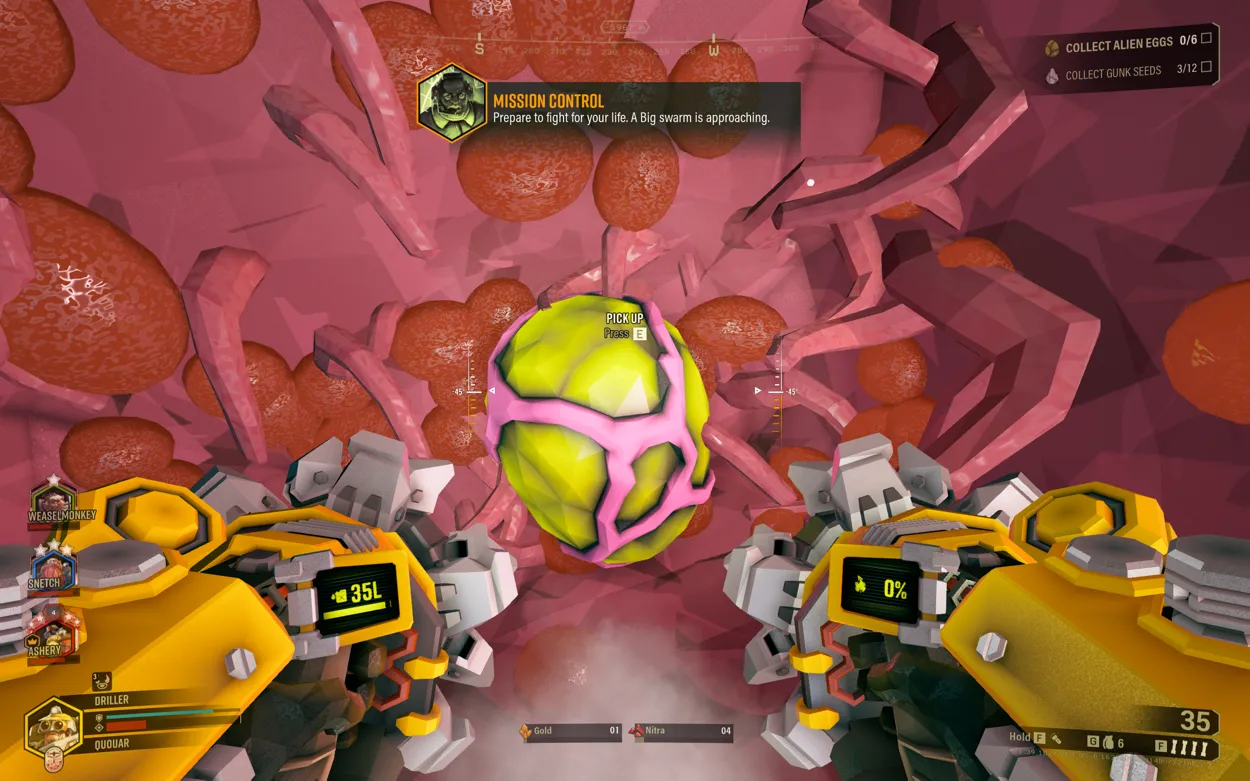 I died five times.
I died five times.
Deep Rock Galactic is a co-operative first person shooter. Each player plays as a dwarf miner, sent to a planet to extract its resources, fend off its natives, and pet everything and anything that can be petted. There is no real overarcing plot - or if there is, I don’t know that I’ve encountered it - just the story of these dwarves, dropping on to a planet, and coming back up at the end.
As an FPS, it has quite a bit to offer. Each dwarf comes equipped with a broad range of weapons, tools, and unique loadouts. Everything from the armour to the perks to the tools is customisable, and customised they will be. Levels themselves are hugely dynamic, with lots of opportunities for customisation to suit each player’s tastes and needs. When I played, for example, my friends were considerate enough to not put the difficulty too high to ensure I was alive at least some of the time. When I did die - as I did, repeatedly - they were also able to come find and resurrect me, meaning I was rarely out of the game for long. Even the structure of the levels themselves are hugely dynamic, with players being able to construct platforms, ziplines, or death pits to their heart’s content. It’s fantastic game design, and it ensures that each level remains unique, even when players have played the game for hundreds or thousands of hours.
And, I’ll be honest, it just doesn’t land for me.
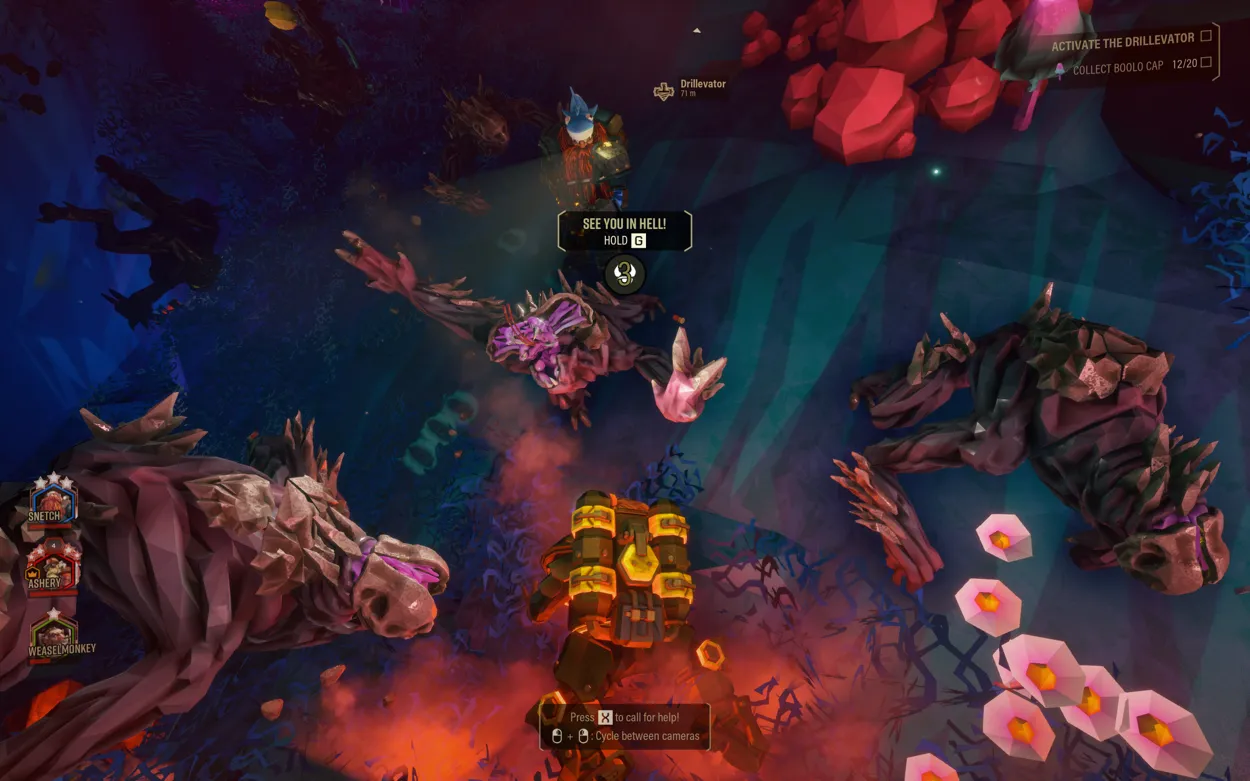 Dead is my default state. Anything else is an aberration.
Dead is my default state. Anything else is an aberration.
I will be blunt - this isn’t my game. I’ve spent an unreasonable amount of time trying to figure out why. I have played over a dozen missions with my friends, listening to them explain what the goal of the level is, what’s expected of my, and what all my various bits, bobs, and whizbangs do. I have dutifully flambeed insects with my flamethrower, petted the drill tank, slapped dice, and chucked explosives out of a door, and yet still, this game doesn’t land for me. It’s not even that I don’t enjoy playing it. I do, for a mission or two, enjoy engaging in the memes and the silliness of wandering through a delicately glowing planet to grab large balls. But then, the experience quickly gets overwhelming, and I sour on it. I spent much of the playthrough I recorded for this review reflecting on why that is, and what it is about Deep Rock Galactic that works so well for thousands of people, but so poorly for me.
My friends might tell me it’s that I need to try different classes, or to play single player, or with someone other than them, and there might be some truth to that. I enjoy playing driller, though, and I enjoy playing with them, and am just generally leery of multiplayer games with strangers, so I don’t know that any of those will necessarily be the answer.
It was at about the point that I sat beside my friend, watching two more friends play Deep Rock Soccer while we all drank beers that I think I figured it out. I figured out not only why the game doesn’t work for me, but why it works so well for everyone else.
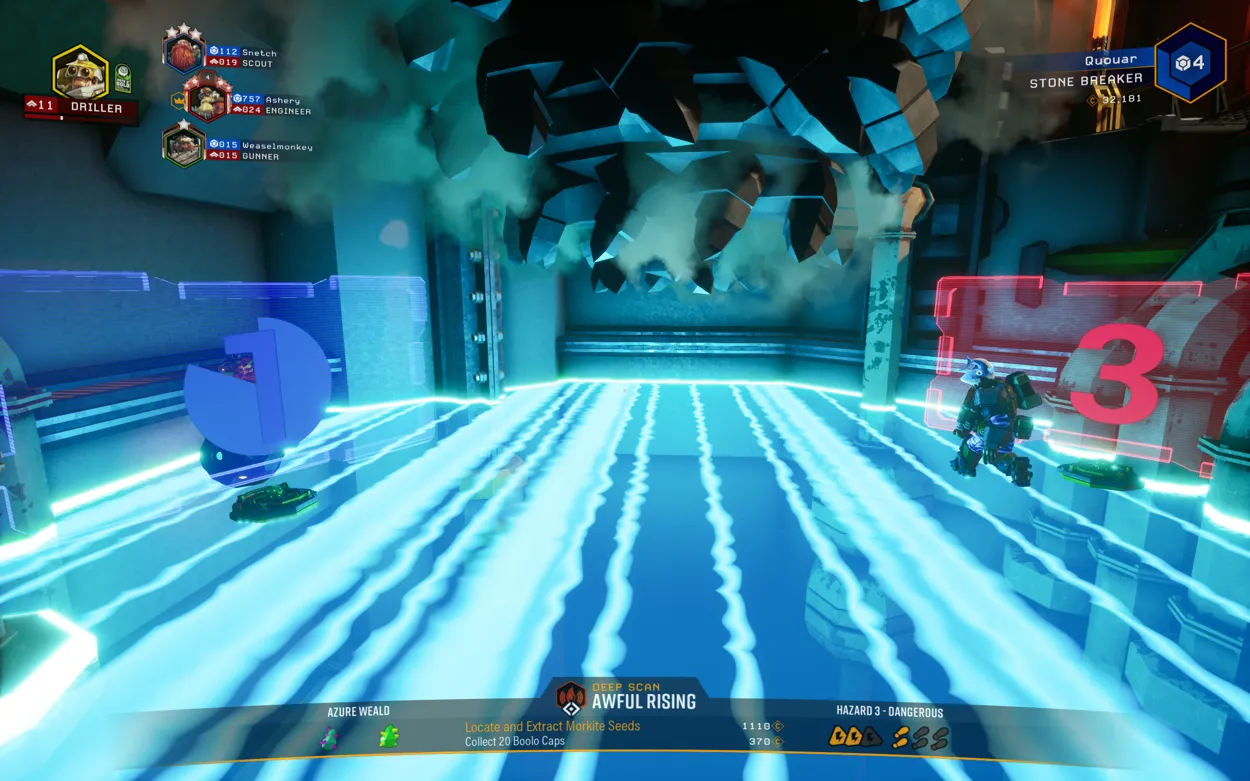 I love that this exists.
I love that this exists.
What Deep Rock Galactic does right that so few other multiplayer games do is foster a genuinely wholesome and cooperative community. This isn’t accidental - the game itself is designed to promote a sense of camaraderie the moment a player joins the lobby. In addition to the level itself and the necessity for players to work together, the lobby is full of opportunities for players to casually interact with each other. From the aforementioned football pitch to a jukebox and dance floor, the game encourages players to not just jump from mission to mission, but to take a moment, have fun and unwind, and enjoy each other’s company before diving in once again. This, in turn, creates a sense of camaraderie between the players that mirrors that between the dwarves. Much like how the dwarves promise not to leave another dwarf behind, as the players climb into the ship and salute each other, they make a similar promise - they are a team, even if one member of the team is me, who struggled to figure out how not to dig a death pit on literally every mission.
This sense of camaraderie - and just good game design as an FPS - is what makes the game so successful and work so well. It’s also, I think, why I struggle so much to find my place within it.
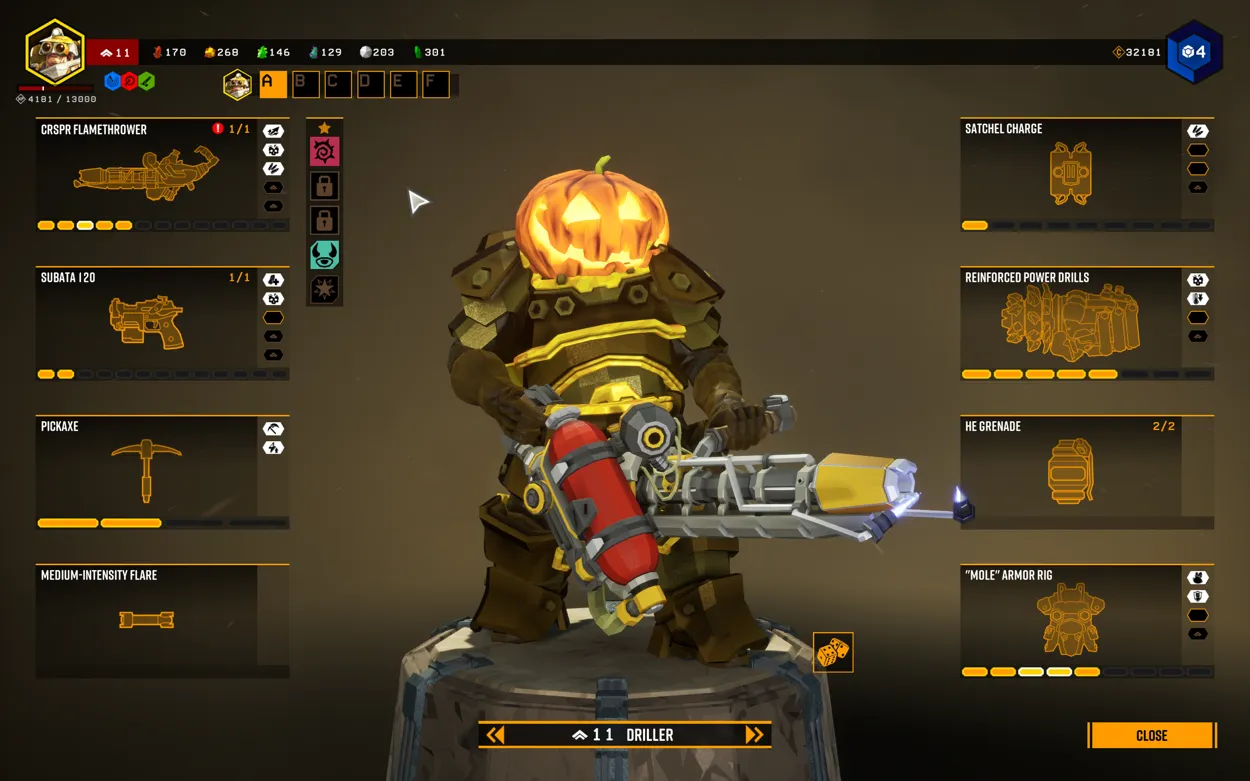 The pumpkind head is a vital part of my build.
The pumpkind head is a vital part of my build.
I’ve written previously about the depiction of neurodiverse people in games , and about how that feels for me, as an autistic person, to experience. Here, I have almost the opposite experience. Deep Rock Galactic does not depict neurodiverse characters, per se, but rather, a very neurotypical dynamic in a very neurotypical space. This is a team of dwarves. They socialise, they build relationships, they share a common culture, and they work together towards their commonly understood goals. There is an assumption of knowledge and tendencies embedded within the fabric of their society, and it’s one the player is asked to quickly understand and adopt. For my friends, this is easy. They understand this culture, how to move into a space and find commonality with the people in it, and how to participate in that sense of camaraderie.
And I…don’t. I struggle enormously with the basics of making connections with people. I don’t pick up on the subtle clues; I learn a group’s norms by chameleoning myself into it, and I memorise the memes and spout them off in the hopes that that’s enough to help me blend in. It is, don’t get me wrong. I blend in just fine, and always have, just not to myself. Engaging with people and building these connections and working together as a team in a shared space is a deeply taxing experience. Within the sheer dynamism of Deep Rock Galactic’s missions, it becomes too much. I get lost and lapse into silence, dutifully following the team, but missing half of what is meant to make the game fun and compelling. I’m lacking that spirit of camaraderie, and no amount of having mission dynamics explained to me will conjure it up. Without it, Deep Rock Galactic becomes just another multiplayer FPS that I’m playing on touchpad. It’s well-designed, but it isn’t the bombastic exploration machine that everyone else seems to be playing. I am an outsider in a culture not designed for me, and I feel every moment of it, even if no one else ever notices that I do.
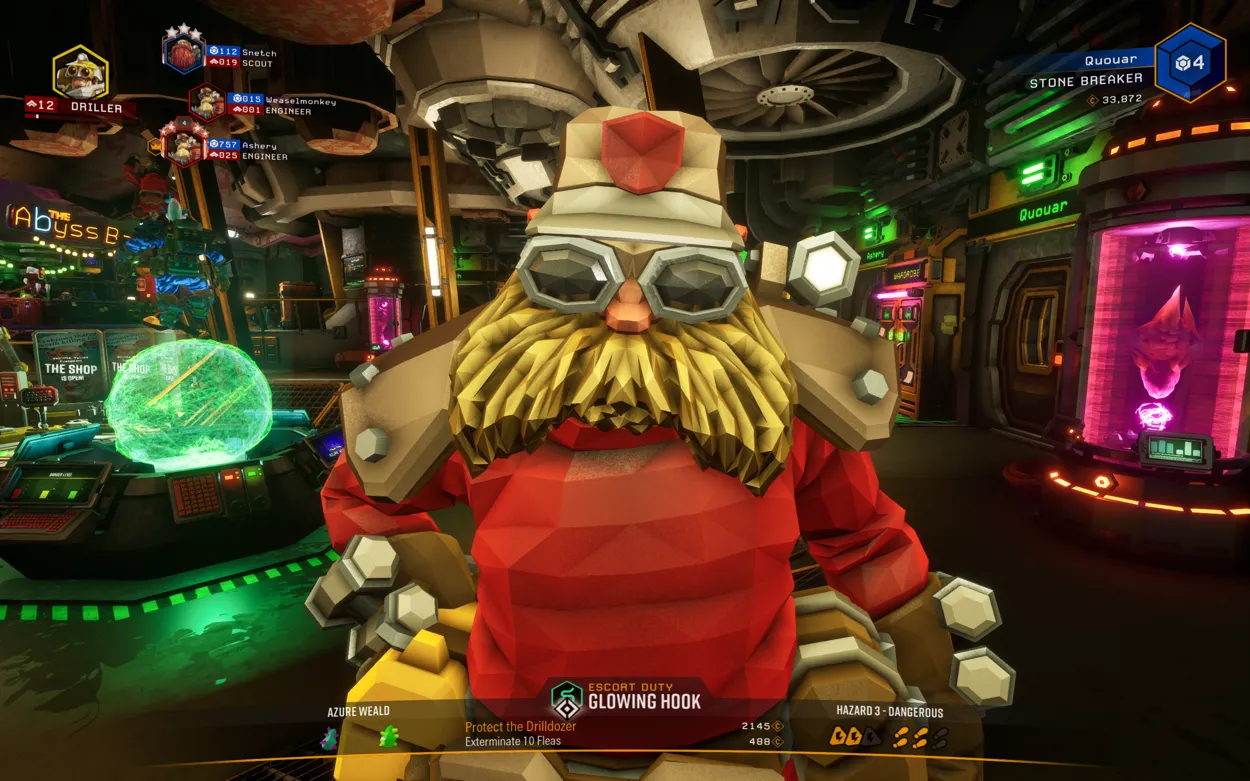 I do still love my friends, though. Just so we’re clear.
I do still love my friends, though. Just so we’re clear.
There is an irony to recognising that the thing that makes a game work so well is exactly the dynamic that makes it not click for me. Equally, though, not every game is for every player. I can recognise that Deep Rock Galactic is objectively good, while also understanding that it is not a game I can find a place in. It’s also not to say that my experience is universal; there are many players who struggle with social connections in the outside world for whom games provide a great opportunity for that social connection. Just not me. What I want from a game and what Deep Rock Galactic offers are on opposite ends of the spectrum, and that’s okay.
I can still wander along with the group, digging my death pits, petting lootbugs, and accidentally blowing up the rest of the team. For Karl.
Developer: Ghost Ship Games
Genre: Fps
Year: 2020
Country: Denmark
Language: English
Play Time: Rock And Stone
Youtube: https://youtu.be/rLo_TR0rK94
